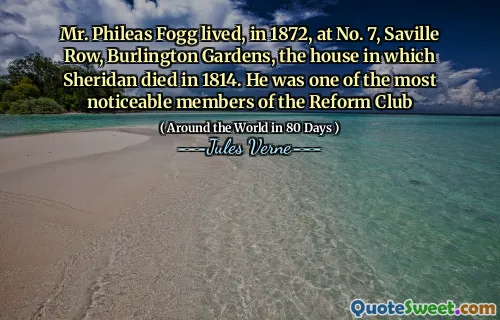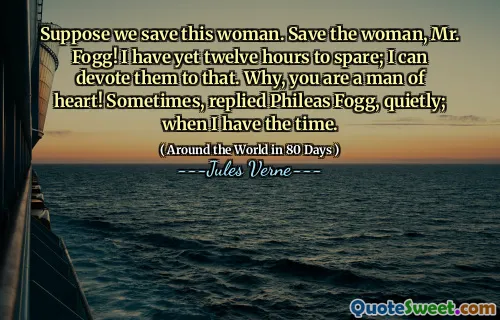"Around the World in 80 Days" is a classic adventure novel by Jules Verne that follows the journey of Phileas Fogg, an English gentleman who bets that he can circumnavigate the globe within eighty days. The story begins with Fogg, who lives a strictly scheduled life, engaging in a wager with members of the Reform Club. The stakes are high, and Fogg, determined to win, sets off on his ambitious quest with his French servant, Passepartout.
As Fogg and Passepartout travel through various countries and face numerous challenges, they encounter a mix of cultures and characters, showcasing the diversity of the world. Throughout their journey, they deal with unexpected delays, including a rescue mission involving an Indian princess, Aouda, which adds a romantic subplot to their adventure. The novel explores themes of time management, technology, and the clash of cultures during the era of globalization.
The story highlights Fogg's unwavering determination and resourcefulness as he navigates obstacles. Despite the tight timeline, he demonstrates that with ingenuity and perseverance, one can overcome setbacks. Ultimately, Verne's tale emphasizes the importance of adventure and the joys of discovery, making "Around the World in 80 Days" a timeless exploration of the spirit of travel.
More »
Today Birthdays
1919 -
J. D. Salinger
1974 -
Ally Carter
1879 -
E. M. Forster
1968 -
Mark Lawrence
1839 -
Ouida
1958 -
Hamza Yusuf
1924 -
Charlie Munger
1897 -
Catherine Drinker Bowen
1940 -
Leonard Susskind
1767 -
Maria Edgeworth
1915 -
John Henrik Clarke
1864 -
Alfred Stieglitz
1863 -
Pierre de Coubertin
1716 -
William Wycherley
1874 -
Frank Knox
1956 -
Christine Lagarde
1972 -
Asghar Farhadi
1934 -
Lakhdar Brahimi
1953 -
Gary Johnson
1973 -
Saffron Burrows
1968 -
Cat Cora
1966 -
Ivica Dacic
1975 -
Ayman Odeh
1745 -
Anthony Wayne
1940 -
Frank Langella
1947 -
Jon Corzine
1895 -
J. Edgar Hoover
1922 -
Fritz Hollings
1826 -
Robert Rainy
1963 -
Laura Ingraham

